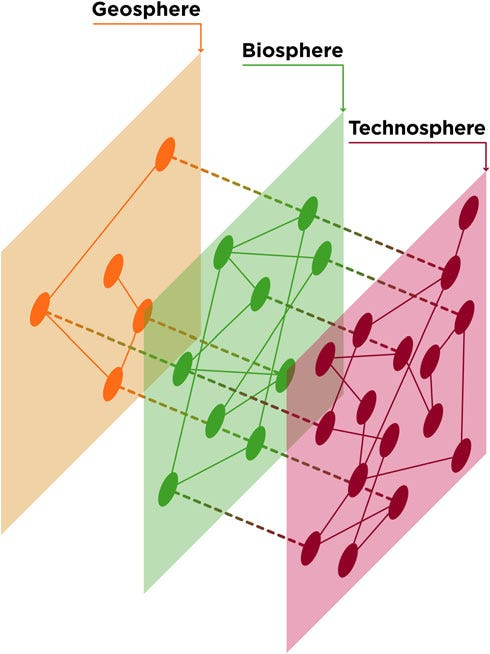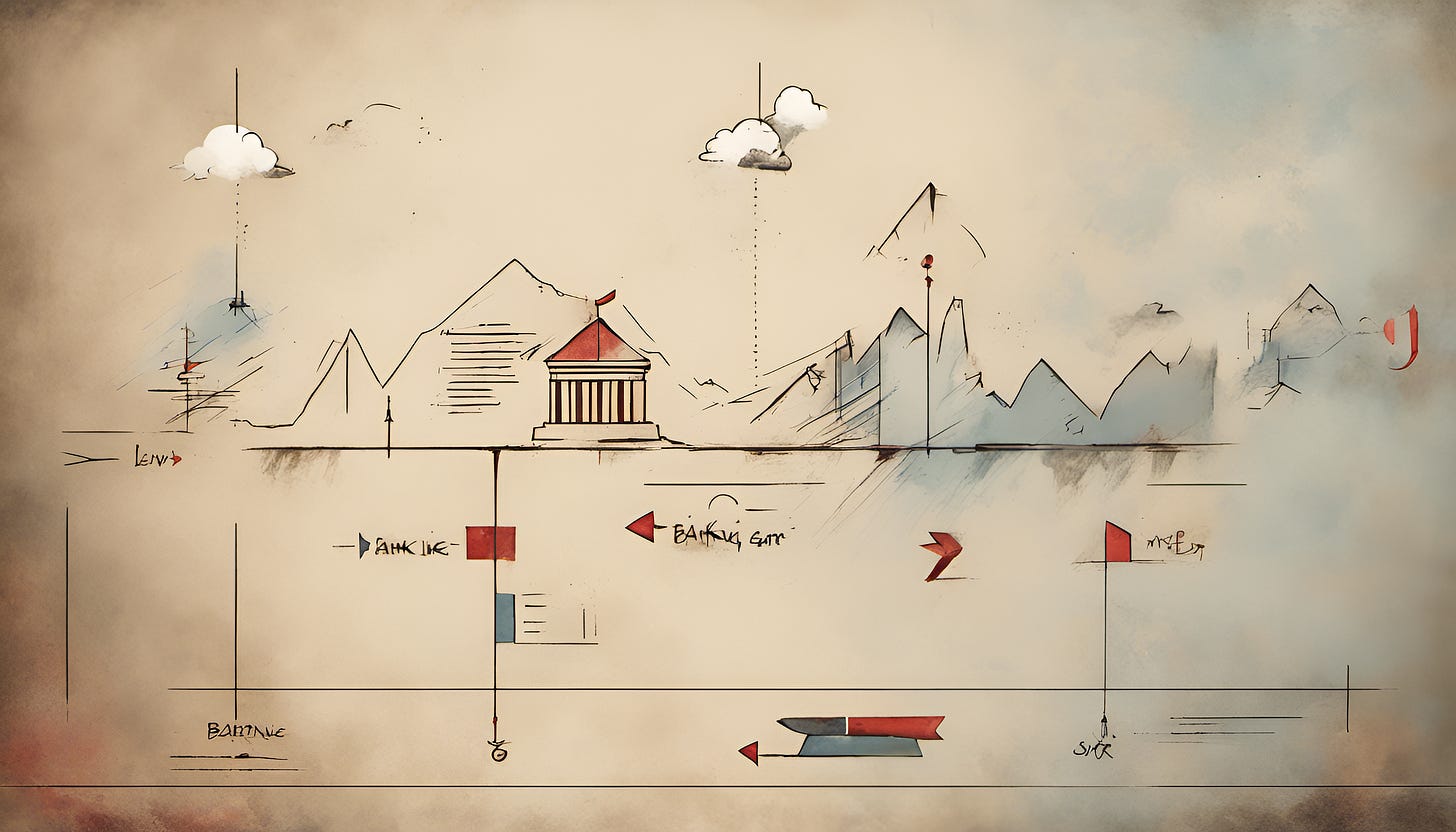The Emergent Field of Planetary Sapience and AI: The New Vanguard of Evolutionary Intelligence
Integrating Technology and Wisdom: Rethinking the Future of Planetary Intelligence in the Age of AI
Integrating Technology and Wisdom: Rethinking the Future of Planetary Intelligence in the Age of AI
The Paradigm Shift: Understanding Planetary Sapience
In the last year, with the public release of various generative AI models, we’ve witnessed a significant shift across multiple domains of our lives. This shift is particularly evident in the emergence of an interdisciplinary field focused on ‘Planetary Sapience.’ This novel concept blends technology with the evolutionary processes of life, suggesting that planetary-scale computation is deeply integrated into, not separate from, the ecological logic of our world.
To fully grasp this paradigm shift, imagine observing Earth from a few light-years away. Through this alien lens, we’d see Earth’s 4.5 billion-year history unfold dramatically: from its primordial chaos, through the explosion of life, to the mesmerizing transformation of our planet. The climax of this story is marked by the rapid emergence of an ‘artificial’ layer — a complex network of satellites and fibers encircling and embedded on the planet’s surface. This development is not just a leap in technology; it represents a profound philosophical shift.
As we envision this accelerated history, we see Earth’s journey unfold with intense drama. Its transformation culminates in the present with the extraordinary rise of this ‘artificial’ layer, symbolizing a significant evolution in our planet’s narrative. This layer bestows upon the planet an unprecedented ability to observe and comprehend itself — a form of planetary self-awareness and reflection. This shift in Earth’s evolution signifies the emergence of a sentient layer, an evolution of techno-as-self. It marks a new epoch where technology is no longer seen as merely an artificial replacement for life, but rather as an integral part of life itself.
Defining Sapience in a Planetary Context
Having touched on the concept of ‘Planetary Sapience,’ we’ll delve much deeper into its full implications down below. But before we get there, let’s define ‘sapience.’ This term is crucial to understanding the transformative shift we’re witnessing in the realm of generative AI and its impact on a global scale.
Sapience encompasses the capacity for advanced thinking, wisdom acquisition, and intelligence. It stems from the Latin ‘sapientia,’ meaning wisdom, discernment, and a deep understanding of the true value of things. Traditionally, sapience has been seen as a defining characteristic of human beings — our ability to reason, reflect, and comprehend. However, in the evolving context of ‘Planetary Sapience,’ this definition takes on a broader scope. It now implies a collective, global intelligence that emerges from the intricate interplay of technology and ecological processes. It signifies a shift towards a new form of consciousness that transcends individual or solely human intelligence, embodying the intelligent, interconnected systems that are developing on a planetary level.
Antikythera’s Perspective: Blurring the Lines Between Natural and Artificial Intelligence
Antikythera, a think tank at the forefront of this concept, argues we are witnessing the early stages of a grand realignment, where the delineation between natural and artificial intelligence blurs. This nascent intelligence is finely detailed yet vast in its reach, integrating itself into the urban landscape and communicating in the subtle code of algorithms, thereby transforming our engagement with the world around us.
In this transformative era, AI transcends mere data collection to become a foundational element of our infrastructure, fostering a dynamic interplay between data visualization, user interaction, and the continuous evolution of intelligent systems — at global scale.
This means that intelligence no longer resided inside a human agent or a single artificial AI system, but rather extends throughout the network establishing a planetary computational system. This sensing skin affects the circulation of people, industrial processes, ecological manifestations, cultural artifacts, and it is itself transformed through this process from the resultant feedback.
As we consider these profound changes, I want to delve into the insights of a member of this think tank, Sara Walker, whose research sheds further light on the evolving nature of intelligence and life itself.
From Cellular Codes to Global Intelligence: Exploring Sara Walker’s Research
Technology is information. This information, selected and refined over time, evolves into dynamic knowledge sets. Our selection and application of this knowledge directly shape potential futures.
This process relied on our ability to abstract through symbols, images, play with temporal alignments, and through these processes produce scientific knowledge. Yet this abstraction process, that which manifest from within, is a product of that which is without, our biosphere. We needed the billions of years of information selection embedded within the biosphere to select eventually for our ability to perform these actions, which now in turn has encoded the biosphere with these new abstractions.
Exploring the roots of information processing in biology, theoretical physicist and astrobiologist Sara Walker illuminates the ancient biological technologies of Earth, dating back nearly 4 billion years. Central to this is the ‘chemistry of translation.’ This process involves the translation system of a cell reading information encoded in DNA sequences, leading to the production of specific protein sequences. This mechanism, akin to a technology, represents a form of intelligence that has been integral to life since its emergence on Earth. Its robustness and longevity are unparalleled, with this biological technology persisting across eons, fundamental to almost all life forms on our planet today.
In the paper ‘Intelligence as a Planetary Scale Process,’ published in the International Journal of Astrobiology, Sara Walker and her colleagues propose a broader view of intelligence. They argue that intelligence is not confined to individual attributes but is a collective phenomenon, manifesting across a spectrum of scales and timeframes, from the decision-making processes of social insects to the intricate chemical interactions within cells. This collective intelligence, exemplified by our global societal behaviors, has the potential to function at the planetary scale.
The elusive nature of life itself is explored in this paper through the concept of emergence, echoing the seminal ideas presented in Erwin Schrödinger’s ‘What Is Life.’ The authors recognize that, despite significant scientific advances, we still grapple with distinguishing the living from the non-living. They draw on Stuart Kauffman’s theory, which posits that life’s evolutionary journey is non-ergodic, navigating a path defined by contingency rather than exploring every potential state. This perspective views life as an emergent phenomenon, the sum of complex interactions that cannot be wholly accounted for by its individual parts. Consequently, intelligence, akin to life, is not confined by scale — It could be a planetary-wide process, woven through the fabric of interconnected systems spanning from the micro to the macro.

To further elucidate some key concepts in Walker’s collaborative article, let’s explore the distinction between ‘Semantic’ and ‘Syntactic’ information. Semantic information pertains to context and meaning within biological processes, while syntactic information deals with the structure and transmission of data. This differentiation is pivotal for understanding how information courses through networks, defining living systems at various scales.
The study underscores the pivotal role of information in demarcating living from non-living systems. This delineation is not only crucial for comprehending life on Earth but also for extraterrestrial life. Living systems channel information through networks that inform behavior and function, showcasing structures consistent across biological scales, contrasting with the randomness of non-living networks. Concentrating on these networks and their information flow opens avenues for a more systematic understanding of life’s behaviors.
Further research into the biochemical networks at cellular, ecosystem, and biospheric levels reveals a commonality in network structure across biological organization scales, distinctive from random networks. Intelligence, as it manifests on a planetary scale, is best described by the information coursing through the technosphere and biosphere’s geochemical and geophysical networks. These networks facilitate processes at higher scales that influence the behavior of their smaller-scale components, much like in social systems where individual choices are shaped by cultural and societal norms.

The Autopoietic View of Life
Autopoiesis characterizes systems that are self-generating and self-sustaining, capturing the dynamic essence of living organisms. This concept sees life as an ongoing act of self-creation, where the delineation of boundaries and regulation of internal processes are fundamental to an organism’s existence and development.
Niklas Luhmann’s ‘Social Systems’ provides a deep dive into autopoiesis, offering a compelling framework for understanding how systems maintain and reproduce themselves. His analysis extends the concept beyond individual organisms, suggesting that entire social systems can be seen as autopoietic.
This perspective on autopoiesis, focusing on systems’ intrinsic ability to self-organize and maintain their form, is instrumental in understanding how information acquires meaning in life. It illuminates the ‘knowing’ inherent in living systems, which respond to and interact with their environment endogenously.
Moreover, this lens allows us to investigate the rise of intelligence not as an isolated phenomenon but as an attribute emerging across scales — from the microcosm of cellular responses to the macrocosm of planetary behaviors. It opens the door to explore intelligence within the vast networks of the Biosphere, through the human-impacted Anthropocene, and even the Technosignatures we may one day detect from Exocivilizations.
Deciphering Planetary Sapience: The Intersection of Evolution and Technology
What does planetary sapience entail within the context of ever-advancing technology? Sara Walker offers insights into this inquiry, stating:
Intelligence is playing a larger role in modern technology, but that is to be expected — intelligence itself improves via evolution. It generates more complex systems — cells, multicellular aggregates like humans, societies, artificial intelligence and now multisocietial aggregates like international companies and groups that interact at the planetary scale. So-called “artificial intelligences” — large language models, computer vision, automated devices, robotics and more — are often discussed as disembodied and disengaged from any evolutionary context. But the technologies we are inventing today represent the recapitulation of life’s innovations into new substrates, and these are allowing the emergence of intelligent life at a new scale — the planetary. There is no “intelligence” in isolation; rather, complex ecosystems of technologies interact with biology to bring about new capabilities.
As human cognition evolved to interpret signals from our sensory organs, we now see the advent of a technosphere that extends our perception to a global scale. This prompts a critical inquiry: why has this manifestation, which Walker refers to as the recapitulation of life’s innovations, emerged so prominently in our current era? What aspects of our times have catalyzed the development of a global technosphere that facilitates planetary sapience?
Peter Sloterdijk, a German philosopher, penned the intense trilogy ‘Spheres,’ culminating in the book ‘Foams.’ Here he examines the Enlightenment’s impetus to bring the unspoken implicit background structures of society into the explicit foreground, a process mirroring the current unfolding of the technosphere.
This layer of global technology is the culmination of our drive to explicate, systematize, and operationalize our environment, transforming it into a liveable and interactive ‘sphere.’ Yet, this process also alienates us from the intuitive, organic modes of existence that characterized pre-modern engagement with the world.
This demystification of the cosmos, the evolution of the modern self, have irrevocably steered us into an era where silence gives way to articulation. The once universal, atemporal syntax that silently directed human conduct now demands active delineation. Our every act and response calls for conscious explication, construction, and the infusion of energy and intention. We are driven for acceleration through efficiency to illuminate and operate within this newly explicit framework.
In this process, we have swapped one ontology for another, yet we rebel against a notion that we must acknowledge this has happened. To do so, to make this ontological transition explicit in our daily lives, is often met with resistance or outright derision.
Sloterdijk may argue that ‘planetary sapience’ is the inevitable outcome of a new teleology, one that was liberated (unleashed!) by the ontological transformation precipitated by the Enlightenment. This period excavated contingency as the primary operative principle of the cosmos and, in so doing, necessitated the advent of a global Technosphere. It is this infrastructure that enables us to capture the efficiencies of scale necessary to navigate our rapidly contracting temporal horizons. This uncompromising quest requires us to make overt the once-covert complexity of our existence, compelling us to engage with an ever-expanding scale of complexity.
Walker and her colleagues describe this shift as “a major transition in planetary evolution,” epitomized by “thinking” technologies — the emergent generative AI models. These technologies may not yet possess thought as we conceive it, but their influence on our cognitive processes is undeniable. These nascent AI models may very well signify this current major shift in the evolutionary narrative of life on our planet Walker and her colleagues describe.
However, this portrayal of an unstoppable march towards complexity warrants a critical eye. This story is itself a construct of a modern (excavated) era fixated on deconstructing, rationalizing, and elucidating every aspect of existence. Sloterdijk would urge us to scrutinize more deeply the premise that complexity is the destined trajectory of the cosmos rather than a consequence of humanity’s insatiable desire to decipher and dominate the natural world.
Just as a cell might evolve along a specific lineage into a multicellular structure (something that’s not inevitable but has happened independently on Earth at least 25 times), the emergence of artificial intelligences and planetary-scale data and computation can be seen as an evolutionary progression — a biosphere becoming a technosphere. -Walker
Is this true though, that there is a universal syntax governing all emergent informational system. The very basic building blocks of information transference, must they all scale up in complexity and energy consumption, and eventually lead to a point of exhaustion? Or is this narrative representative of an impoverished epistemology and ontology?
In line with Sloterdijk’s skepticism towards universal narratives, the framework presented by Walker and colleagues I think should be critiqued for its Western-centric approach, which overlooks the diverse and non-linear trajectories of knowledge and existence found across different cultures and historical contexts such as those found in Indigenous epistemologies.
Indigenous Perspectives: Relational Ontologies and Ecological Wisdom
Indigenous knowledge systems perceive the Earth as a living entity, imbued with spirit or consciousness. In many indigenous worldviews, all elements of nature are interrelated and possess a form of intelligence or spirit — rocks, rivers, plants, and animals are all considered sentient beings — a holistic ecology. Humans are an intricate part of this web of life, not separate or above it. This relational ontology sees humans as kin with the Earth and its systems, engaging with the world through a respectful and reciprocal relationship.
This sort of epistemologies is axiologically embedded. This means that they include an ethical and spiritual base associated with relationships between people, nature, and the cosmos. Axiology has been extricated from Western scientific inquiry because of its inclusion of spirituality and religion. Yet this comes at an extreme cost as it forecloses the possibility of allowing a broader, more expansive understanding of our cosmology.
This consideration of axiologically embedded Indigenous epistemologies, integrating ethics and spirituality into knowledge formation, stands in sharp contrast to the objectivist foundations of Western science. This divergence leads us to ponder: might there be a pathway yet untraveled, not of compromise, but of convergence and synthesis? Can we unlock a new route that synergistically merges Indigenous Ways of Knowing with the empirical rigor of Western science?
The concept of “Two-Eyed Seeing,” advocated by Mi’kmaw Elder Albert Marshall, offers such a path. It invites us to see through one eye with the strengths of Indigenous knowledges and Ways of Knowing, and through the other eye with the strengths of Western scientific knowledge. This approach does not merely juxtapose these perspectives but seeks to integrate them, creating a richer, more comprehensive understanding of the world.
“Two-Eyed Seeing” emphasizes the importance of respecting and valuing both ways of knowing, recognizing that each provides unique insights and understandings. This approach, far from being superficial, acknowledges the significant consequences borne from the 16th-century ontological shift, urging us to delve into these ancient and profound insights.
Building on this idea Willie Ermine insightful paper in the Indigenous Law Journal, ‘The Ethical Space of Engagement,’ introduces a critical concept for navigating the interactions between Indigenous and Western societies. Ermine presents the ‘ethical space’ as a zone formed when two distinct cultures, each with their own worldviews, prepare for engagement. This space isn’t just a physical domain but a realm of thought and understanding, crucial for genuine dialogue.
Ermine emphasizes that entering this space demands an acknowledgment of the unique histories, knowledge traditions, and philosophies of each society. Through embracing humility, we can create a framework where diverse perspectives can coexist, not by erasing differences, but by respecting and learning from them. The ‘ethical space’ thus becomes a crucial area for fostering understanding and reconciling seemingly disparate legal, ethical, and knowledge systems.
In the realm of planetary sapience, which emphasizes a particular type of linear progression towards greater complexity and technological integration, Ermine’s ‘ethical space’ introduces a productive dimension of reflection and recalibration that enlarges the field of potential paths rather than constricting them. It challenges the background assumption that the trajectory towards higher complexity and technological advancement is the only or inevitable path. By facilitating a dialogue between Indigenous and Western perspectives, the ‘ethical space’ encourages a critical examination of these evolutionary and teleological narratives. It opens up possibilities for alternative understandings of progress and development, where the value of interconnectedness, sustainability, and respect for diverse knowledge systems are given prominence.
In the realm of planetary sapience, there is an emphasis on expansive temporal scales, which I interpret as a form of temporal ontological violence. This approach privileges a broad evolutionary perspective that can inadvertently warp and distort our understanding of socio-cultural contexts.
Walker states at the end of her Noēma piece:
Life on this planet is very deeply embedded in time, and we as individuals are temporary instances of bundles of informational lineages.
This beautiful and poetic passage profoundly struck me, yet seems to diverge from her broader arguments. It evokes a dissonance with the immediate human experience and actions. The following statement in her work…
We are deeply human (going back 3.8 billion years to get here), and this is a critically important moment in the history of our planet but it is not the pinnacle of evolution.
…further accentuates this inconsistency. It suggests a narrative where the vastness of evolutionary history overshadows the current moment, potentially neglecting the critical importance of present cultural and societal needs. What is crucial for cultures, as dynamic entities, is how we navigate and shape our existence now — how we can empower others to realize their vision of a good life within the constraints and possibilities of our current time.
I see an imbrication between these two competing relational ontologies found in axiologically embedded Indigenous epistemologies, and the Western-centric objectivist epistemologies that Walker and her colleagues advance. This intersection invites us to reevaluate our approach to understanding and interacting with our world. It calls for an integration of wisdom that respects both the deep time of our planet’s history and the immediacy of our current cultural and societal needs. Such a synthesis could pave the way for a more balanced, respectful, and sustainable future, where different ways of knowing are harmonized to navigate the complexities of our evolving world
Synthesizing Wisdom: Toward a Holistic View of Planetary Sapience
One thing I lament about a piece I recently wrote, ‘AI’s Lone Banana Problem: Art, Ontology, and the Unseen Threat’ is that I did not provide space to explicate my believe in balance. Although in the background of my piece that is what was informing my narrative, I did not really foreground that in a way that was explicit.
I do not see AI, and technology in general, as evil, or incompatible to a holistic relational ontology. In fact I believe the opposite. I see technology and AI as enhancing our lived experience, enriching our socio-cultural context, if we integrate new emergent technologies in a balanced holistic way. This entails a radical empiricism, the likes John Dewey and William James wrote about.
Benjamin Bratton, the director of Antikythera and Professor of Philosophy of Technology and Speculative Design at the University of California, San Diego, ended his piece on Planetary Sapience with this call:
What future would make the past worth it? Perhaps the future of planetary intelligence is now as existentially entwined with a radically different career for composition, foresight and order-giving as its advent was from the cascading centuries of pilotless destruction. Taking this new existential condition seriously demands a radically different sort of philosophy.
Rauna Kuokkanen a Research Professor of Arctic Indigenous Studies at the University of Lapland, offers just such a radically different sort of philosophy Bratton is looking for; from her book ‘Reshaping the University: Responsibility, Indigenous Epistemes, and the Logic of the Gift,’
We need to start learning from the gift. The gift is both a paradigm and a practice, and it is about forging a new logic grounded in responsibility toward the “other” and defined as the ability and willingness to reciprocate not only at the level of human interaction but also at the epistemic level. To call for the recognition of the gift of indigenous epistemes is to call for an epistemic shift founded in a specific philosophy.
The origin of the word ‘data’ in Latin, meaning ‘something given,’ suggests an inherent notion of data as gift. This perspective aligns intriguingly with Rauna Kuokkanen’s concept of ‘learning from the gift.’ In the realm of Indigenous epistemologies, data should be seen not just as an excavated collection of facts and figures but as a reciprocal exchange, a gift embodying knowledge and understanding grounded in responsibility toward the ‘other.’









